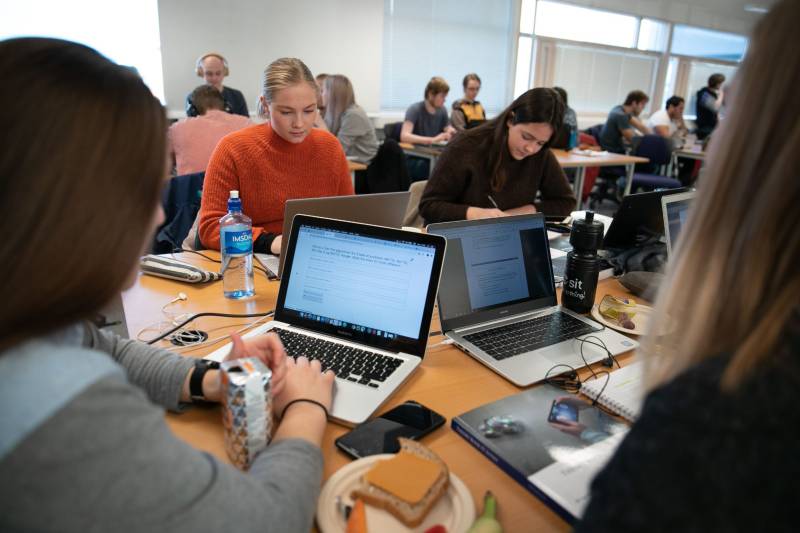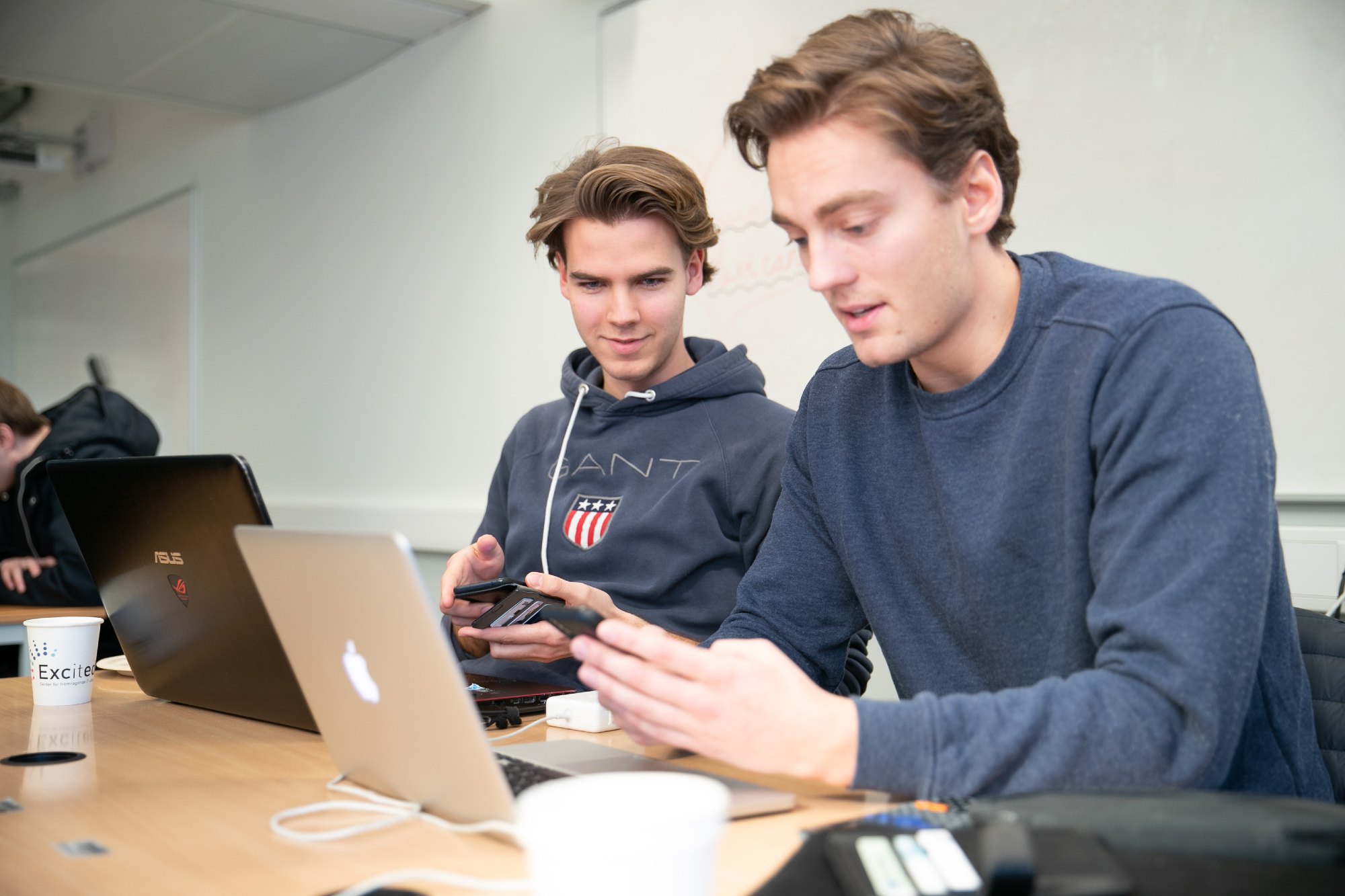IDI workday
The students appreciates organized study days
IDI workday has been a sucsess from the first semester.

There is a good atmosphere around the table. First-year students Karen Dahl Aarhus, Emilie Lia-Rognli, Siw Døvle, Sigrun Nummedal and Julie Holte Motland all study computer science and as every week, they attend IDI work day.
IDI working day is part of the subproject "Projects of becoming". New students starting our study programs have embarked on two major and challenging projects; In short term; to become a student. In the longer term, through study, they will end up with identity as a professional IT professional. “Projects of becoming” supports the first year student so that they become successful project managers for both of these projects. IDI work day is an important element to support this transformations.
Students start the day with a full breakfast. The rest of the time is devoted to independent work supported by a fixed group of learning assistants.
- We have very good access to the learning assistants here. That is why I usually choose the Work day to do the exercises I need the most help with. It's very effective, and I don't think I would have done all the exercises if it wasn't for this day, says Aarhus.
The first graders in computer science have their Work day on Wednesdays, and computer technology has Thursdays - all day.
- I think it works very well. If nothing else, there is a reason to get out of the apartment and go on campus to work, says Lars Strømholm.
Strømholm sits on the neighboring table with Emil Hjelle, Kaspar Paus Græsdal and August Rolfsen, and has participated in the group with the girls on every Work day this semester.
- It is very nice that we can gather around a table in this way. This project facilitates collaboration, he adds.
Academic content and low threshold
And that's exactly the reasoning behind the work day, according to fellow Madeleine Lorås. She was involved in starting the Work day and is one of those who have overall responsibility for the offer.
- We saw many students sitting at home. Maybe they were in their lectures, but they participated little beyond that. This led to several negative ripple effects, such as not being able to meet and get to know the other students, nor the teachers,” says Lorås.
The purpose of the working day was thus stated in three points:
• That the students get the experience that the place of study is a workplace.
• Students can get to know each other and keep in touch with each other.
• That the students get a good academic benefit from the initiative and develop good study habits.
- Loneliness is a big problem, and the idea was that in order to attract those who primarily wanted professional training to participate, we had to make an offer with a low threshold, where the focus was on professional work. And then it is not primarily professional content that is the theme, because we do not control it, but rather that you should have a professional affiliation with your class. That you should have a place to work, says Lorås.
Thus, the Informatics Work Day pilot became a reality. We started a pilot only for the computer science students. After a semester, the offer was expanded to include computer technology students, and when the pilot proved a success and was part of the program, it changed its name to IDI working day.
- Since the start up, the project has become twice the size. There have been some growing pains. For example, we now coordinate six subjects, previously four. So we needed more student assistants, and it was a bit more of a coordination job.
Lorås says that at the same time it has become much more self-driving.
- Learning assistants who were also involved last year now run it almost on their own. At the same time, we have professionalized the collaboration with the mathematics community.
Mathematics is a subject many of the students see as difficult the first year, and the learning assistants employed on the Work day have no special competence in math besides having taken the subjects themselves.
- Math is a profession that many find difficult. So we have been in meetings with the Department of Mathematical Sciences, and got a learning assistant with competence in mathematics, available two hours a week, she says.
- Many people don't quite know what they have started
So far, it seems that the IDI working day has had a good effect. Andreas Aursand is a master student and learning assistant and has worked on the Working day since the start. He says that the focus on varied skills is something that has evolved since its inception.
- We have some learning assistants who are good at Python, some are good at web technology, and some are good at other subjects. We even have one person who masters the entry level philosophy course, Ex Phil. We all lean quite heavily on him when we have students struggling with those assignments. He is quite the philosopher.
Aursand has learned that in addition to math, it’s the programming the students need help with.
- Many people do not know exactly what kind of study program they have started. They may have chosen the direction because it is a study with a high degree of certainty to get a job after graduation, which it definitely is. Many of them have not touched upon coding before coming here, and then they become very uncertain about what to do.
This is a situation that Aursand recognizes.
- Most of the students are struggling with something that our learning assistants also remember to struggle with in the first year. If anyone asks, I say it will get better over the years. Many are struggling now, and most likely will struggle a little, but it gets easier. If they work steadily then things will eventually fall into place.
Is this an offer you could have imagined yourself as a newcomer?
- Absolutely. I think I would have had a much better first and second semester if this offer had existed then. For my part, I wasn't quite sure where to find my fellow students, as people studied just about everywhere. I also think the threshold for asking for help would have been much lower if we had such an offer. So I certainly would have joined, Aursand says, adding with a smile:
- So I've been thinking for a while that it's a shame that I started five years ago and not now.
Gode tilbakemeldinger
During the course of the Work day, Lorås has continuously had the students evaluate it. The feedback so far supports what she and Aursand have experienced. Around 70 per cent of those who responded say they "agree" or "strongly agree" both in the assertion that the offer makes them work more efficiently and that they are more motivated to work with their studies. Almost 90 per cent responded that they wanted the offer next semester as well.
- Obviously these are good numbers, but I don't think this Work day should have all the honor for it, because it is probably composed, says Lorås, before she draws attention to areas with further potential for improvement:
- What I find more interesting is that far from it all the students are participating. There are 140 students in these study programs, and we have between 40 and 60 participants. That is not even half of them. Where's the rest?
Lorås has a theory that those who actually come are the ones who feel at home as students already: those who have made friends and are part of a gang.
- I mean, this has such a low threshold that even those who feel a little outside should be able to join, yet I do not feel that is the case. And of course, it can have many explanations. Some may be voluntarily solitaire and spend their time elsewhere, so they do not feel as strongly about belonging to the field of study they are in. And that's okay. I just want to get hold of those who are at risk of dropping out.
So far, she has spoken to the study counselors so they know about the offer and can recommend it to students who are unaware of it or who feel lonely. The learning assistants also actively look for students sitting alone. Often it is self-elected that the students sit alone, but by having the learning assistants check in, you make sure that all the students get to talk to someone during the Work day and they can facilitate contact with others who work with the same tasks.
- Of course, it is perfectly fine if the students want to work on their own, but we think it is better if the learning assistants contact the students too much rather than too little, she says.
Want to schedule work day as any other course
Trond Aalberg is project manager for "Projects of Becoming" and is supervisor for Lorås PhD project.
- This has started as a project under the Excited Center for Excellence in Teaching, but the goal of all the projects in Excited is that they should be sustainable and useful measures that the institute can continue when the center is closed, says Aalberg. Now Aalberg and Lorås are working to bring the working day into more a more organized frame.
- We see that there is a need to be able to plan such activities on par with other teaching. Today, the scheduling at NTNU is based on the needs of the individual subjects. This makes it difficult to design organized activities and measures across the study program's needs. So far we have succeeded in finding available times and negotiating with those responsible for the courses, but this is not a viable solution - not least when all the study programs from Kalvskinnet are moved to Gløshaugen. Support for such planning in the systems at NTNU will make the project more self-sustaining, and require less organization from us - in addition, it is also an advantage if the working day automatically appears in the students' schedule.
What the day will look like in the end, both practical and in content, they are still uncertain.
In addition, there is a debate about whether it should offer more than food and learning assistants.
- An idea is to start each day with a short inspirational lecture. At the same time, it will go beyond the concept, which is just to have a day where the students can work undisturbed.
Good effect in NORD
Excited is a partnership between IDI at NTNU and the Faculty of Social Sciences at NORD University. At NORD this semester they have had something they have called "Afternoon workshop", built on the Work day model from Trondheim. Teaching assistant Astradur Larusson at Northern University has been working on the project since its inception to test out the successful concept on a another campus, university and study program.
- The idea is the same, students should be able to get help and learn things they need to be able to do for their studies. Things that may not be taught directly in any of the lectures. Or things they will learn eventually, but we think it is better that they learn as early as possible, he says.
The workshops have been every Monday, from four to eight, and have been kicked off each time by a short lecture. It has been a success.
- The offer has been much more popular than I had imagined. The students also seem to like the lectures well, and we have had a continuous dialogue with them on what topics they want.
At the same time, Larusson says, they have taken into account what the students have been learing in their classes, so that the lectures have covered a topic related to this.
- For example, when they were teaching game trailers, the lecture was about making trailers.
Who’s holding these lectures varies. Sometimes they bring in external forces. For example, , recently it was a company that manufactures games. They explained how they worked and let the students try the games. As a rule, there are people internally at the university, and often Larusson and the other learning assistants give lectures to.
- Recently I talked about an event called Game jam, in connection with it being arranged shortly after. And we experienced record attendance at the event. So it seems like it works.
In Steinkjer, they have also noticed the social benefits associated with such an offer.
- It seems that this offer does a lot of good for the social environment of the study. The students find each other. They collaborate and make contacts.

 The first-year students at Informatics at NTNU boast the scheme IDI working day. Especially the combination of independent work, with the possibility of help, they point out as positive. From left: Emil Hjelle, Kaspar Paus Græsdal, August Rolfsen, and Lars Strømholm. Photo: Kai T. Dragland / NTNU
The first-year students at Informatics at NTNU boast the scheme IDI working day. Especially the combination of independent work, with the possibility of help, they point out as positive. From left: Emil Hjelle, Kaspar Paus Græsdal, August Rolfsen, and Lars Strømholm. Photo: Kai T. Dragland / NTNUThis is a good place to work
The students on the fourth floor of the science building are also callobrating and making contacts. Most are done with all their compulsory exercises, and therefore fewer students are present than usual. Still, most tables are busy.
- There is quite the noise level here, so it is always tempting to look for a group room, says Græsdal.
Still, he and the rest of the gang always stays seated.
- The concept where you can both get help from a learning assistant, while also discussing with others works very well. It brings together people who have the same subjects and are stuck on the same things, Rolfsen says.
Strømholm agrees:
- There is a lot of help to be had. There is always someone in the room who can help with what you are struggling with.
And, if we are to believe the students, the learning assistants will have to settle on plenty of questions next semester.
Because you often use the learning assistants?
